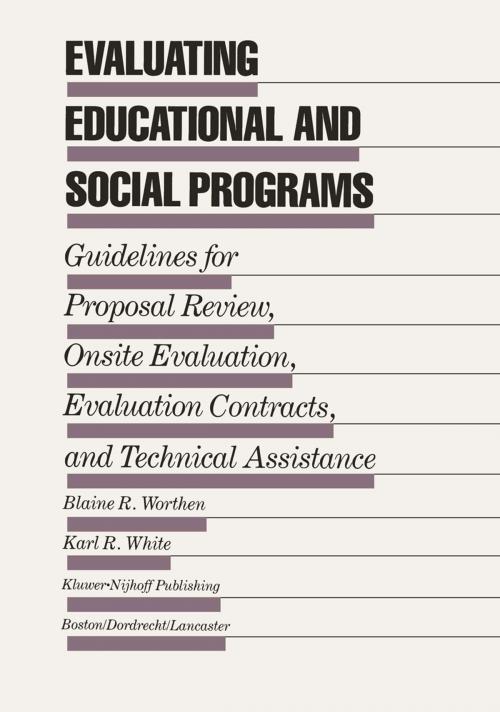Evaluating Educational and Social Programs
Guidelines for Proposal Review, Onsite Evaluation, Evaluation Contracts, and Technical Assistance
Nonfiction, Reference & Language, Education & Teaching, Educational Theory, Evaluation, Testing & Measurement| Author: | Blaine R. Worthen, Karl R. White | ISBN: | 9789401174206 |
| Publisher: | Springer Netherlands | Publication: | December 6, 2012 |
| Imprint: | Springer | Language: | English |
| Author: | Blaine R. Worthen, Karl R. White |
| ISBN: | 9789401174206 |
| Publisher: | Springer Netherlands |
| Publication: | December 6, 2012 |
| Imprint: | Springer |
| Language: | English |
During the past two decades, evaluation has come to play an increasingly important role in the operation of educational and social programs by national, state, and local agencies. Mandates by federal funding agencies that programs they sponsored be evaluated gave impetus to use of evaluation. Realization that evaluation plays a pivotal role in assuring program quality and effectiveness has maintained the use of evaluation even where mandates have been relaxed. With increased use --indeed institutionalization --of evaluation in many community, state, and national agencies, evaluation has matured as a profession, and new evaluation approaches have been developed to aid in program planning, implementation, monitoring, and improvement. Much has been written about various philosophical and theoretical orientations to evaluation, its relationship to program management, appropriate roles evaluation might play, new and sometimes esoteric evaluation methods, and particular evaluation techniques. Useful as these writings are, relatively little has been written about simple but enormously important activities which comprise much of the day-to-day work of the program evaluator. This book is focused on some of these more practical aspects that largely determine the extent to which evaluation will prove helpful.
During the past two decades, evaluation has come to play an increasingly important role in the operation of educational and social programs by national, state, and local agencies. Mandates by federal funding agencies that programs they sponsored be evaluated gave impetus to use of evaluation. Realization that evaluation plays a pivotal role in assuring program quality and effectiveness has maintained the use of evaluation even where mandates have been relaxed. With increased use --indeed institutionalization --of evaluation in many community, state, and national agencies, evaluation has matured as a profession, and new evaluation approaches have been developed to aid in program planning, implementation, monitoring, and improvement. Much has been written about various philosophical and theoretical orientations to evaluation, its relationship to program management, appropriate roles evaluation might play, new and sometimes esoteric evaluation methods, and particular evaluation techniques. Useful as these writings are, relatively little has been written about simple but enormously important activities which comprise much of the day-to-day work of the program evaluator. This book is focused on some of these more practical aspects that largely determine the extent to which evaluation will prove helpful.















